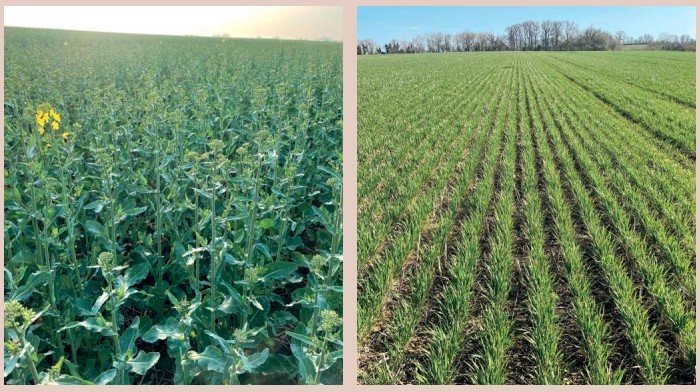
Last night we hopefully had the last frost of the year as the OSR is just starting to flower. I think we can finally relax with pigeon patrol. This has been relentless and my Father has spent a huge amount of time chasing them over the last few months. It seems to have paid off as the crop does look excellent whereas many have in the area have been eaten by pigeon. It is probably not a very “regen” thing to say but it does feel like the main way to getting some reasonably OSR is to drill it early, give it loads of early N, and keep the pigeons off. Last year where we didn’t do these three things well enough we had some poor crops. Lessons learnt. OSR is a real difficult one as to whether to keep growing it. It can be very profitable but is hit and miss. Brings early drilling and early harvest but I have to stay our slug pressure is concerning post OSR. I keep being told the beetles will eat the slugs but their obviously is not enough of them despite not using any insecticides for years. We will carry on growing it as I believe the benefits out weigh the weaknesses of the crop at the moment.
OSR has had its total spring N (140kgs)and a foliar of the usual magnesium and molasses etc. That may well be door closed until harvest unless conditions are good for a foliar flowering N and other goodies. Another question is how and if we desiccate it? It could cost over £40/ha just to spray the stuff off. We actually have more combining capacity these days so direct cutting is an option being discussed and could well be the way forward.

Malting barley, as usual went luminous for a week or two. It now looks normal again. It also has had its total N (100kg/ha)and a tonic of the usual stuff that appears to be needed on this soil. There is not much to report about winter barley apart from one failure on my part. One field had very poor straw chop due to a damp and brackled crop that needed shaving. It has resulted in some gappy areas where germination was poor and slugs attacked. That is a lesson learnt if it really is chopping badly. It will certainly knock yield a bit and is unsightly, MUST DO BETTER.
We do have some Blackgrass in wheat this year, mostly second wheat and some after OSR. These areas we will inter row hoe with the Claydon Terrablade and see how we get on. Maybe they will need doing twice. We are not in yield affecting levels of Blackgrass by any means, but I would like to take out as much as we can on these areas. I imagine we will run the hoe through about 15% of our wheat area and 5% barley (brome). We have had the hoe for a year now but did not really get the chance to do much with it last year. If it works well then perhaps a bigger, better penetrating camera guided hoe will be on the cards. Our aim is to keep Blackgrass at an economic level.
Spring drilling will be starting imminently. We have about 1500 acres to get through which will probably mostly be done with our tined sprinter. I really worry with the disc drill in the spring as we have seen time and time again the slot can just open up and dry out very quickly. This is regardless of whether it’s been drilled into dead cover, green cover, stubble, rolled, unrolled etc